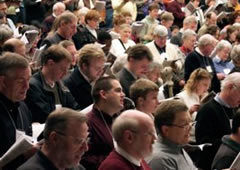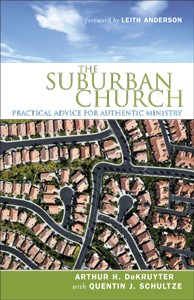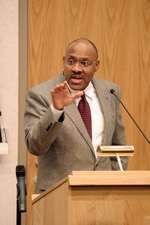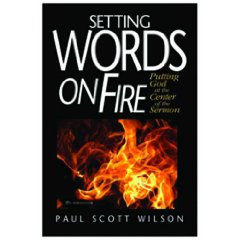 Earlier in the week, in what was an exhausting set up and tear down, we had a glorious few days selling books in Harrisburg with pastors who had gathered at the annual State Pastors Conference organized by our friends at the Pennsylvania Council of Churches. This tends to draw mostly mainline denominational clergy, but that, of course, is a large and diverse tribe, and the Council provides a big tent. We love working with such an interesting group, talking books with Lutheran and United Methodist clergy, Church of the Brethren and Moravians, lots of UCC pals and local Episcopalians. There were a few American Baptists and Presbys, a few very thoughtful Roman Catholics—quoting First Things and ecumenism and such— and, lo and behold, a couple of ethnic Pentecostals. Praise be to God. And, it seems, most of these leaders mostly liked our display. As always—after lugging stuff down awkward freight elevator and through a huge hotel kitchen with blazing stovetops and giant hot cauldrons, we look back and can’t believe it is over.
Earlier in the week, in what was an exhausting set up and tear down, we had a glorious few days selling books in Harrisburg with pastors who had gathered at the annual State Pastors Conference organized by our friends at the Pennsylvania Council of Churches. This tends to draw mostly mainline denominational clergy, but that, of course, is a large and diverse tribe, and the Council provides a big tent. We love working with such an interesting group, talking books with Lutheran and United Methodist clergy, Church of the Brethren and Moravians, lots of UCC pals and local Episcopalians. There were a few American Baptists and Presbys, a few very thoughtful Roman Catholics—quoting First Things and ecumenism and such— and, lo and behold, a couple of ethnic Pentecostals. Praise be to God. And, it seems, most of these leaders mostly liked our display. As always—after lugging stuff down awkward freight elevator and through a huge hotel kitchen with blazing stovetops and giant hot cauldrons, we look back and can’t believe it is over.
As you might guess, our passions for cultural reformation and the empowerment of laypeople to impact their spheres of influence led us to push books like Andy Crouch’s Culture Making and social concern books like Jim Wallis’ Great Awakening or a brand new book, Wendell Berry and the Cultivation of Life: A Reader’s Guide by J. Matthew Bonzo & Michael R. Stevens (Brazos; $21.99). You may have seen the Christian Century article a year or so ago which, like the common advice given by Eugene Peterson, suggests that Berry’s views of stewarding the land in a rural place is insightful for those caring for a Christian flock in a church. Not many of the pastors took me up on the notion (maybe because it seems pricey) but I will review it in earnest, later. It is a fabulous work, applicable for anyone that loves literature, or, well, a life well lived and I had hoped pastors would be excited about it.
I gave a heartfelt pitch for a book that is precisely designed to help clergy help laypeople see faith “as a way of life” entitled Faith as a Way of Life: A Vision of Pastoral Leadership by Christian Scharan and a forward by Miroslov Volf (Eerdmans; $15.) Scharan worked with the Yale Center for Faith as a Way of Life and this three-year study group made up of clergy, artists, theologians, economists and the like, interviewed hundreds of pastors to find the best practices that help them equip lay folks into living faithfully in every sphere of life. I am so grateful that they are describing one aspect of Pastoral Excellence in terms of how faith flows into life, belief informs behavior.
Vision of Pastoral Leadership by Christian Scharan and a forward by Miroslov Volf (Eerdmans; $15.) Scharan worked with the Yale Center for Faith as a Way of Life and this three-year study group made up of clergy, artists, theologians, economists and the like, interviewed hundreds of pastors to find the best practices that help them equip lay folks into living faithfully in every sphere of life. I am so grateful that they are describing one aspect of Pastoral Excellence in terms of how faith flows into life, belief informs behavior.
So: we try to do our thing, helping these fine pastors find books that they may not find at a big box store, or even at a typical store that serves mainline clergy. From pomo emergent stuff to contemplative spirituality, racial justice to the books about film and the arts, promoting books about these broader Christian concerns seems to be appreciated.
Yet, we do, of course, stock plenty of the quintessential books for pastors and for parish health and development. We have all the Alban Institute books—nearly every single one— and other such cutting edge, practical resources. A personal favorite that just arrived is a great sequel to the great Transforming Congregational Culture by Anthony Robinson. Entitled Changing the  Conversation: A Third Way for Congregations (Eerdmans; $18) it offers ten conversations that renewing congregations need to have. Robinson invites church leaders and members into these ten crucial topics that can help change their culture (framing them all by the quest to find alternatives to extremes, something other than fundamentalism and liberalism, a welcome approach indeed.) Martin Copenhaver says of it, “Robinson has done it again. Building on his previous work, which many of us have found indispensable, he has written a book full of insights and wisdom. No one writing about church life today writes with more depth and perception.”
Conversation: A Third Way for Congregations (Eerdmans; $18) it offers ten conversations that renewing congregations need to have. Robinson invites church leaders and members into these ten crucial topics that can help change their culture (framing them all by the quest to find alternatives to extremes, something other than fundamentalism and liberalism, a welcome approach indeed.) Martin Copenhaver says of it, “Robinson has done it again. Building on his previous work, which many of us have found indispensable, he has written a book full of insights and wisdom. No one writing about church life today writes with more depth and perception.”
Time did not allow for me to describe a new book by Jeff Lucas, but its opening story, about Itzhak Perlman playing an nearly impossible Bach piece with a missing string, is so moving, it is worth the price of the book for that alone. Creating a Prodigal Friendly Church (Zondervan; $14.99) uses a clever device, naming each chapter (in Italiano) after a movement in music. That God’s lilting melody of love would be better heard is the theme of his heart, and he helps churches learn how to best have prodigals engulfed in the song they so long to really hear. How can he help those who have drifted or left the church, perhaps angry or bored…can a church adopt an open heart, he asks, that will in turn open its doors to everyone? This is a fast-paced little book, full of stories and ideas and practical notions that would benefit most churches. We have plenty of books on how churches can make first good impressions, be hospitable, welcoming and friendly. I hope you know, for instance, the thoughtful and gracious No Perfect People Allowed: Create a Come as You Are Culture at Church by John Burke (Zondervan; $14.99.) We have an edition with a DVD included making it a great training tool or adult ed class.
Last year one of the keynote speakers was Quentin J. Schultz, who spoke on technology–very good. He told me then that he had a forthcoming book in the pipeline, and it was nice to show it off this week. It is called The Suburban Church: Practical Advice for Authentic Ministry which Q co-wrote with Arthur H. Dekruyter (Baker; $18.95) and it reflects upon the unique challenges of pastoring those who are suburbanites. We also, by the way, pushed the new Ron Sider & John Perkins book that I’ve mentioned before on the blog, Linking Arms Linking Lives on urban/suburban church partnerships. I don’t know what it will take to get this book talked about, but I think it is very, very important, for all kinds of congregations and all kinds of settings. It is a masterpiece of wholistic theology, multi-faceted Kingdom ministry, and very useful for helping churches in their move towards being more missional.
was nice to show it off this week. It is called The Suburban Church: Practical Advice for Authentic Ministry which Q co-wrote with Arthur H. Dekruyter (Baker; $18.95) and it reflects upon the unique challenges of pastoring those who are suburbanites. We also, by the way, pushed the new Ron Sider & John Perkins book that I’ve mentioned before on the blog, Linking Arms Linking Lives on urban/suburban church partnerships. I don’t know what it will take to get this book talked about, but I think it is very, very important, for all kinds of congregations and all kinds of settings. It is a masterpiece of wholistic theology, multi-faceted Kingdom ministry, and very useful for helping churches in their move towards being more missional.
We told of some of our favorite books of the year, doing a short reading out loud from The Year of Living Biblically by A.J. Jacobs (now out in paperback) and the exquisite memoir by Andrew Krivac, Th
e Long Retreat (an elegant and moving memoir I wrote about a few months ago.) We promoted serious theology, prayer, small group resources, leadership development, conflict resolution. There are two brand new books by Walter Brueggemann, Great Prayers of the Old Testament (Westminister/John Knox; $16.95) and Abingdon’s brand new first entry in the “Library of Biblical Theology” simply entitled Old Testament Theology: An Introduction ($32.00.) We had tables and tables of liturgical resources, lectionary preaching guides, and the books of prayers and litanies and worship planning books that pastors from some denominations need. You wouldn’t believe how much of that sort of stuff we have!
And, we there were tons of books on preaching. The speakers this year were all homileticians, and we were happy to have the resources of Gail O’Day and new favorite preacher, Cleophus LaRue, extraordinary wordsmith from Princeton Seminary, author of several books on the power of black preaching.
homileticians, and we were happy to have the resources of Gail O’Day and new favorite preacher, Cleophus LaRue, extraordinary wordsmith from Princeton Seminary, author of several books on the power of black preaching.
And, we were the first store in the country to have the brand new book by master theorist of preaching, Paul Scott Wilson.
 His brand new one is called Setting Words on Fire: Putting God at the Center of the Sermon (Abingdon; $27) and includes a DVD, showing excerpts of different sorts of styles, approaches, and forms. Co-produced at Calvin College, it apparently includes a clip of Scott Hoezee, one of my favorite pastor/writers and I look forward to checking it out myself. I suspect it will be tremendous. I owe a special thanks to my sales rep, Linda B. from Abingdon Press, who helped us acquire this before it technically released. It was pretty cool having it with the ink nearly wet, and even Paul Wilson himself had not seen the finished product yet.
His brand new one is called Setting Words on Fire: Putting God at the Center of the Sermon (Abingdon; $27) and includes a DVD, showing excerpts of different sorts of styles, approaches, and forms. Co-produced at Calvin College, it apparently includes a clip of Scott Hoezee, one of my favorite pastor/writers and I look forward to checking it out myself. I suspect it will be tremendous. I owe a special thanks to my sales rep, Linda B. from Abingdon Press, who helped us acquire this before it technically released. It was pretty cool having it with the ink nearly wet, and even Paul Wilson himself had not seen the finished product yet.
Moments like these remind us how joyous it is to unite words and readers, writers and publishers, book-seller and book-buyer. I pray that Mr. Wilson’s vision–God at the center of the sermon–would indeed set many preachers and their words on fire, so that all of our churches would be renewed and revitalized. You who read theological and other Christian books, supporting booksellers like us, and the authors we promote, spreading the good ideas, helping them gain traction in your churches and fellowships are part of the plan. Thanks. Soli deo gloria.

my marriage needs help